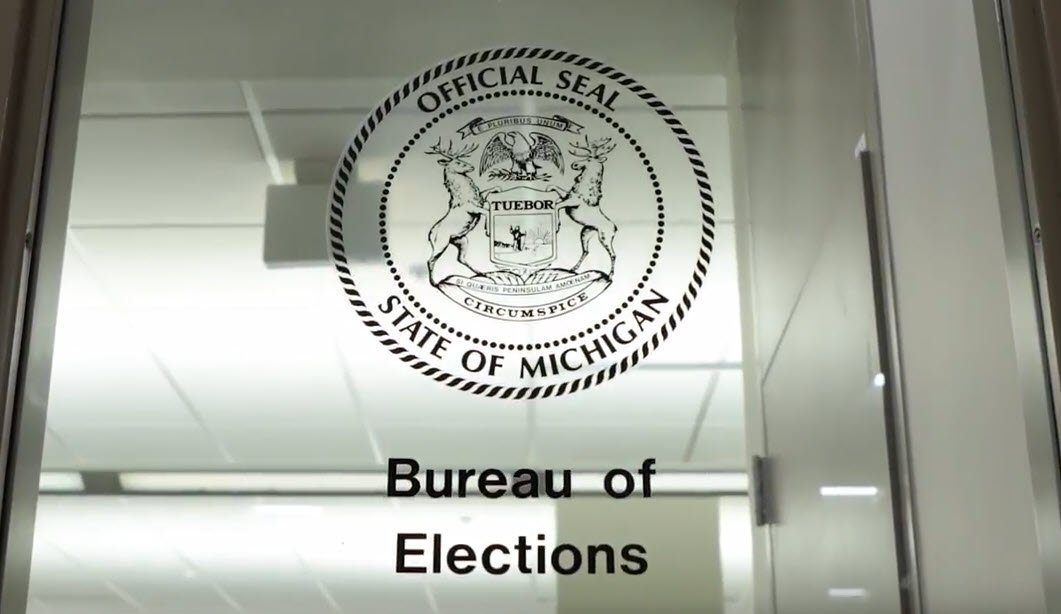Michigan Republicans Stumble in Dress Rehearsal for Overturning Future Elections
The state’s supreme court restored abortion and voting rights measures to November’s ballot, rebuffing “a game of gotcha gone very bad.” But its composition could soon change.
Daniel Nichanian | September 9, 2022


Ever since allies of Donald Trump in Michigan failed to stall the certification of Joe Biden’s win in 2020, they have pursued a methodical purge of election officials who affirmed the results, replacing them with new canvassers who wanted to overturn the election—and who could thwart the will of voters in the future.
Conservatives put their cards on the table sooner than expected. With Trump’s possible comeback bid still two years away, Republican members of Michigan’s State Board of Canvassers last week blocked two proposed constitutional amendments regarding abortion rights and voting rights. They flouted the usually-decisive recommendation of the state’s Bureau of Elections, which had determined that both measures received more than enough signatures to appear on the November ballot.
The state Supreme Court intervened on Thursday in a pair of 5-2 decisions that will put both amendments on the Nov. 8 ballot. Michiganders will decide on that day whether to codify the right to access abortion in the state constitution and whether to expand ballot access by strengthening a slate of procedures like mail-in voting.
The rulings mark a failure for Michigan Republicans’ trial balloon for subverting future elections, whether the 2024 presidential race or the midterms. Once again, GOP canvassers weaponized their role in the long chain of custody over election processes, and this time they stayed unified long enough to halt routine procedures. But a majority on the high court did not blink, signaling that they are willing to act as a backstop—and could again in the future.
“It was dangerous for democracy when Canvassers in Michigan said they would refuse to certify the election results in 2020,” Josh Douglas, a University of Kentucky professor specialized in election law, told Bolts. “The Michigan Supreme Court’s decision on both of these initiatives show that refusing to put these issues on the ballot was the same kind of overreach.”
For Leah Litman, a professor of law at the University of Michigan, the sequence of events at least establishes a precedent for how the state’s high court could intervene after the 2022 or 2024 elections if GOP canvassers similarly attempt to block results.
But that road map would only work “if the court stays the same,” she added.
Two justices on the Michigan Supreme Court are running for re-election in November—Democrat Richard Bernstein, who voted with the majority on Thursday, and Republican Brian Zahra, one of the dissenters. The GOP would flip the seven-member court if it sweeps both seats. On the one hand, that would not have been enough to change Thursday’s rulings since Republican Elizabeth Clement voted with the four Democrats.
Still, the two rulings were handed down almost along party lines and Clement did not write an opinion in either, leaving some uncertainty over how a higher-profile partisan confrontation over a presidential election would unfold.
Since Thursday’s rulings, Justice Bridget McCormack, a Democrat who was part of the majority in both rulings and whose term was meant to last through 2029, announced she will leave the court by the end of this year. Democratic Governor Gretchen Whitmer will appoint her replacement, who will need to face voters in November 2024. The next two years could also bring an unforeseen vacancy on the court, which would be filled by whomever wins November’s governor’s race between Whitmer and Republican Tudor Dixon, who is endorsed by Trump and has falsely said the 2020 election was stolen.


The justices traded unusually acrimonious barbs in their rulings on Thursday, testifying to a polarized court. Earlier this summer, when the Michigan Supreme Court issued a landmark series of rulings that expanded protections for youth against extreme sentences, most were issued on 4-3 party-line votes. Much as he did on Thursday, Zahra was the most caustic of the dissenters.
The latest dispute about the State Board of Canvassers centered on whether they have authority in elections beyond simply aggregating and affirming the analyses and results counted by others.
The GOP canvassers claimed that their rejection of the abortion rights referendum, which would effectively overturn a pre-Roe abortion ban that is currently enjoined by courts, was based on a typographical error on the ballot petitions that reduced spacing between some words. Proponents of the amendment, who had collected a record number of signatures to put it on the ballot, rebuffed that argument on the merits. But they also responded that it’s not up to the state canvassers to adjudicate such questions and that the board exists as a ministerial body.
The exchange echoes the aftermath of the 2020 election, when Trump allies pressured Michigan’s county and state canvassers to investigate the results transmitted to them by lower boards—rather than fulfill their usual role of effectively just adding up tallies. Attacked by Trump’s allies, one Republican member of the Wayne County Board of Canvassers who certified the results said at the time, “The only thing that the Board of Canvassers has the authority to do is to compare the statement of voters, the number of ballots that were received versus the number of ballots that were tallied and to make any mathematical corrections.”
Mari Manoogian, a Democratic state Representative who represents Michigan’s Oakland County in the legislature, testified in front of the State Board of Canvassers in November 2020, telling them they were overstepping their role in acting as though they could ignore election results. “To me, this is a very similar situation,” she told Bolts this week about the initiatives.
“The State Board of Canvassers really had a ministerial duty to certify both petitions, and they didn’t follow through with their duties,” she said. “I’m deeply concerned with their unwillingness to do their jobs and their propensity toward caving to partisanship regarding the certification of elections and regarding the certification of valid proposals. It’s a dangerous, slippery slope.”
Chief Justice Bridget McCormack, writing for the majority on Thursday, echoed this assessment of the two Republican state canvassers. “They would disenfranchise millions of Michiganders not because they believe the many thousands of Michiganders who signed the proposal were confused by it, but because they think they have identified a technicality that allows them to do so, a game of gotcha gone very bad,” she wrote in the decision on the abortion ruling. “What a sad marker of the times.”
The court’s rapid intervention this week could assuage some of the uncertainty that would be sure to follow if county or state Republican canvassers refuse to certify Michigan results in 2024 and help stem the chaos. Trump allies hope to sow confusion as a strategy to justify extraordinary measures, like having lawmakers step in.
And in two years justices could find it even easier to step in. One of two ballot measures the Republican state canvassers tried to block last week is worded to constrain their ability to thwart future elections. The voting rights amendment contains a section that would enshrine in the state constitution that it is the “ministerial, clerical, nondiscretionary” duty of county and state canvassers to certify election results by doing no more than aggregating the statement of votes shared by lower counting boards.
Douglas told Bolts that, if voters approve the amendment in November, it could add a layer of protection by giving state courts additional language to cite to force canvassers to honor election results. “I think that this is one of those situations where the duty exists already but that it’s not harmful to lay it out so it’s abundantly clear,” Douglas said. “I think that makes it even clearer to the canvassers that they can’t choose not to certify. It gives them much less wiggle room to try to justify their actions.”
Litman stressed, though, that doubling down on legal standards would not dissuade people who are willing to go rogue—especially if they have already signaled they are eager to do so.
“The reality is that under existing law the board was already supposed to have clerical and ministerial duties,” Litman said. “And yet the board tried to prevent this ballot initiative as well as [the] reproductive freedom ballot initiative from getting on the ballot. So I don’t know if… the GOP members of the board will abide by the law any more going forward.” She added, “maybe after this case and this initiative they will.”
The article was updated on Sept. 12 with news of Bridget McCormack’s retirement.


